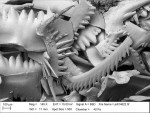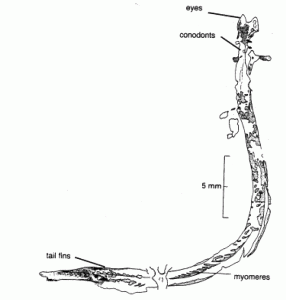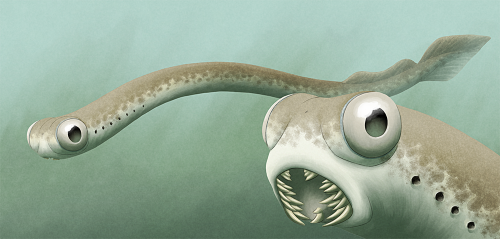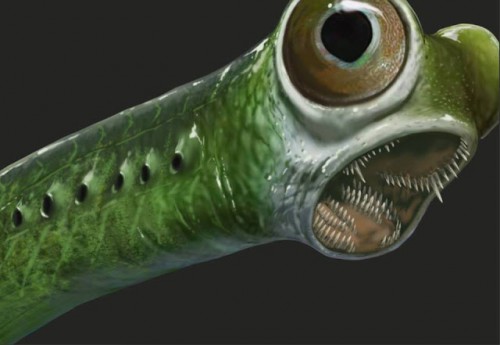Conodonts are strange and extinct animals that left behind lots of fossils: their teeth. Practically nothing else but teeny-tiny, jagged, pointy teeth. I remember when the animals themselves were total mysteries, and no one even knew what phylum they belonged to — it was only in the 1980s that a few eel-like soft tissue fossils were found, and they were recognized as chordates (very small chordates, on the order of millimeters to centimeters long) with big eyes and membranous fins.
And now today I find two artistic reconstructions of the conodont animal that please me.
Aren’t they pretty? If you’ve seen any of these animals (not likely, since they’ve been extinct since the Triassic or thereabouts) let me know. I have aquaria. I would like to raise a few thousand.
I’d also like to figure out what they’re doing with those nasty teeth.






These are some beautiful drawings. At first sight, I immediately thought of arrow worms (Chaetognatha), but if these guys are chordates, then they’re from a very different phylum. I too wonder what they were doing with those teeth. If it’s anything like what arrow worms do, it was probably pretty gruesome.
Eating something.
Here is a recent attempt to work out the conodont bite: https://youtu.be/wJunXtPFK-0
Yikes! Great drawings. The creatures really jump out. This reminds me of the types of ancient creatures in the Giant Evolution Timeline product from Evolution for Kids!
http://www.charliesplayhouse.com/the-giant-evolution-timeline.html
Wonderful educational toy for children.
Tom @ 3 – Very interesting simulation of the feeding mechanism.
Maybe they evolved a bit, & then found their way to the planet Arrakis (Dune)?
Fascinating beasts. I worked with them as a dating tool for nearly 30 years before I retired. Got some photos but can’t seem to post them.
Gary, that sounds kinda geeky, but, did you get lucky & get a date?
Gary, I guess you did. You got the photos, eh.
Gary, please accept my apologies. I do realize the importance of the kind of research that you were doing. (I just couldn’t resist trying to make a joke.)
One of my favorite professors (now emeritus), Cal Stevens at San José State in California, did some work on conondonts as dating tools in the areas adjacent to the Owens Valley, CA. I took a couple of classes from Cal, and he loved to show a really gruesome pen sketch of what a conodont might look like. This was back nearly in the Pleistocene, when the display tool of choice in classrooms was the overhead projector… but damn, that thing looked like it was about to jump off the screen and devour us. Amazing creatures.
As drawn it looks like the teeth may have served the same function as the teeth of hagfish or lamprey. If so they may have been more parasite and scavenger than predator.
Actually, if you’ve ever seen the Stephen King movie: “Dreamcatcher”, they look almost EXACTLY like the little alien worms that hatch out of eggs.
My sinuses suddenly hurt for some reason…
Staring in my nightmares, obviously.
So would they, apparently. It looks like they’re screaming in terror.
“I’d also like to figure out what they’re doing with those nasty teeth”
They use them to capture prey to eat, of course. You’ll have to supply them with their typical cuisine…whatever that was.
I became aware of these neat creatures while reading about the P/T extinctions. And one of the annoying things is that the different Conodont zones within a fossil sequence rarely, if ever, line up with other fossil used for dating — ammonites, gnathostomes, radiolaria, and other small (well, the ammonites are an exception), ubiquitous and short-lived fossils.
Hmmm. Having such an incredibly useful fossil to correlate relative ages is such an unlikely event that maybe it is proof of gods?
FXSOUND OF AN IMMATERIAL BEING SELF-DESTRUCTING and, heard off in the distance, “Oh, dear, never thought of that.” POOF!
Paleobait.
Why, I saw one go swimming by just last week… (well, almost)
https://youtu.be/9ILzlby69sQ